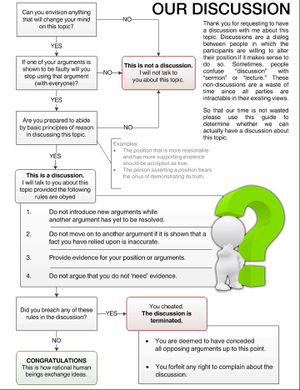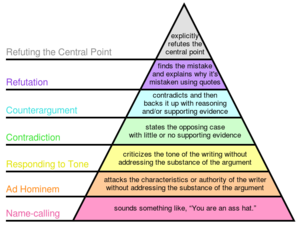Difference between revisions of "Issuepedia:Arguing"
Jump to navigation
Jump to search
(→source dependency: link to "spaghetti-throwing") |
("in general" is now "Rules") |
||
| Line 10: | Line 10: | ||
''I have cross-posted these guidelines to [[lwwiki:User:Woozle/debate guidelines|LessWrong wiki]] in hope of sparking further refinement. --[[User:Woozle|Woozle]] 15:58, 10 September 2010 (UTC)'' | ''I have cross-posted these guidelines to [[lwwiki:User:Woozle/debate guidelines|LessWrong wiki]] in hope of sparking further refinement. --[[User:Woozle|Woozle]] 15:58, 10 September 2010 (UTC)'' | ||
| + | ==Rules== | ||
| + | :1. '''[[/assertion]]s''': An assertion that has not been [[/challenge|challenge]]d may be assumed to be true. | ||
| + | :2. '''[[/challenge]]s''': When an assertion is challenged, | ||
| + | ::2a. [[/challenge/undefended|if it remains undefended]], it must be assumed to be false. | ||
| + | ::2b. [[/challenge/responsibility|responsibility]] for resolving a challenge rests with the person who made the assertion. | ||
| + | :3. '''[[/clarity]] of arguments''': Responsibility for making an argument clear lies ''on the arguer'', not the respondent. | ||
==Guidelines== | ==Guidelines== | ||
[[File:Our-Discussion.jpg|thumb|related guidelines from a different source]] | [[File:Our-Discussion.jpg|thumb|related guidelines from a different source]] | ||
| Line 17: | Line 23: | ||
When arguing against another person's statements: | When arguing against another person's statements: | ||
:1. DO '''address the ''substance''''' of the argument you are disputing. | :1. DO '''address the ''substance''''' of the argument you are disputing. | ||
| − | :2. DO '''be clear''' about what you're trying to say. | + | :2. DO '''be [[/clarity|clear]]''' about what you're trying to say. |
:3. DO '''take a position''' before [[position dancing|attacking the positions of others]]. | :3. DO '''take a position''' before [[position dancing|attacking the positions of others]]. | ||
:4. DO '''offer arguments''': | :4. DO '''offer arguments''': | ||
| Line 41: | Line 47: | ||
:* No position is perfectly correct; the challenge is to find the position that is the ''least wrong'' | :* No position is perfectly correct; the challenge is to find the position that is the ''least wrong'' | ||
:10. ...tell the other person to "go look it up yourself" when asked for evidence. If you do not provide a specific source, this is an indication that you do not actually have the evidence you claim to have. | :10. ...tell the other person to "go look it up yourself" when asked for evidence. If you do not provide a specific source, this is an indication that you do not actually have the evidence you claim to have. | ||
| − | |||
| − | |||
| − | |||
| − | |||
| − | |||
| − | |||
| − | |||
===source accuracy=== | ===source accuracy=== | ||
| Line 57: | Line 56: | ||
===source dependency=== | ===source dependency=== | ||
When outside material contains extensive information relevant to your argument: | When outside material contains extensive information relevant to your argument: | ||
| − | * '''Spell out the point it makes''' – rather than expecting others to read it. ('''No required reading.''') | + | * '''[[/summarize|Spell out]] the point it makes''' – rather than expecting others to read it. ('''No required reading.''') |
** Otherwise you are counting on your opponent to not only ''understand'' it but ''agree with you'' as to its applicability to the discussion. | ** Otherwise you are counting on your opponent to not only ''understand'' it but ''agree with you'' as to its applicability to the discussion. | ||
** If you can't defend your own point in your own words, then perhaps you don't understand what you're arguing -- or perhaps you don't understand what you're arguing against, and are hoping that something somewhere in the required reading will suffice as a rebuttal. ('''Sources are not arguments.''' Claiming that a source makes your point is not the same as making your point. '''No [[spaghetti-throwing|throwing stuff at the wall]]''' and hoping something sticks.) | ** If you can't defend your own point in your own words, then perhaps you don't understand what you're arguing -- or perhaps you don't understand what you're arguing against, and are hoping that something somewhere in the required reading will suffice as a rebuttal. ('''Sources are not arguments.''' Claiming that a source makes your point is not the same as making your point. '''No [[spaghetti-throwing|throwing stuff at the wall]]''' and hoping something sticks.) | ||
Revision as of 14:47, 2 February 2013
About
Unlike other reference projects, Issuepedia welcomes personal opinion.
However:
- Any opinion is an assertion of fact.
- Any assertion may be challenged.
- A challenged assertion that is not defended with a rational, evidence-based argument need not be taken seriously.
Also, attempts to undermine other debaters by use of logical fallacies and other rhetorical deceptions will be called out.
I have cross-posted these guidelines to LessWrong wiki in hope of sparking further refinement. --Woozle 15:58, 10 September 2010 (UTC)
Rules
- 1. /assertions: An assertion that has not been challenged may be assumed to be true.
- 2. /challenges: When an assertion is challenged,
- 2a. if it remains undefended, it must be assumed to be false.
- 2b. responsibility for resolving a challenge rests with the person who made the assertion.
- 3. /clarity of arguments: Responsibility for making an argument clear lies on the arguer, not the respondent.
Guidelines
The following are informal guidelines for engaging in debate; see project:Structured Debate for a more formal set of rules.
things to do
When arguing against another person's statements:
- 1. DO address the substance of the argument you are disputing.
- 2. DO be clear about what you're trying to say.
- 3. DO take a position before attacking the positions of others.
- 4. DO offer arguments:
- for why the other debater's statements are unlikely to be true.
- to support what you think is correct.
- 5. DO respond to every point you wish to oppose.
- Failure to respond to a point does not make it untrue.
- If a point remains unanswered, it is reasonable to consider it true.
- 6. DO draw attention to any unanswered points.
- Others may assume or erroneously believe that unanswered points have actually been defeated.
things to avoid
It generally does not strengthen your position if you:
- 1. ...attack the other person's credibility (expertise, credentials, personal habits, age, affiliations, etc.).
- 2. ...attack things the other person didn't actually say.
- 3. ...attempt to emotionally manipulate the other person or the audience.
- 4. ...attempt to associate the other person's views with shameful actions they do not support.
- 5. ...use vague statements in place of a clear argument.
- 6. ...simply contradict the other person without any further substantiation.
- 7. ...cite a work of myth or scripture as an authority on non-doctrinal questions.
- Do not assume that any authority or source will be accepted without question; the only valid argument from authority is one where all parties accept the authority as valid.
- 8. ...misrepresent other people's arguments.
- 9. ...attack positions taken by others without taking a clear position yourself.
- No position is perfectly correct; the challenge is to find the position that is the least wrong
- 10. ...tell the other person to "go look it up yourself" when asked for evidence. If you do not provide a specific source, this is an indication that you do not actually have the evidence you claim to have.
source accuracy
When disputing the accuracy of a source, or of an argument based upon a fact stated in a source:
- DON'T simply claim that the source is unreliable.
- DON'T simply claim that the fact is wrong.
- DO identify better sources.
- DO offer correct information.
source dependency
When outside material contains extensive information relevant to your argument:
- Spell out the point it makes – rather than expecting others to read it. (No required reading.)
- Otherwise you are counting on your opponent to not only understand it but agree with you as to its applicability to the discussion.
- If you can't defend your own point in your own words, then perhaps you don't understand what you're arguing -- or perhaps you don't understand what you're arguing against, and are hoping that something somewhere in the required reading will suffice as a rebuttal. (Sources are not arguments. Claiming that a source makes your point is not the same as making your point. No throwing stuff at the wall and hoping something sticks.)
- Pasting quotes is acceptable, but summaries are better -- especially if written to be specific about the matter under discussion.
- If the source's argument is complicated, state the conclusion it draws and summarize the general nature of the arguments used. You need to give others at least enough of a basis upon which to frame further counters (or, hopefully, questions).

